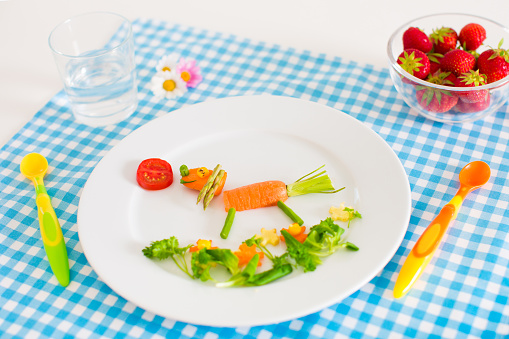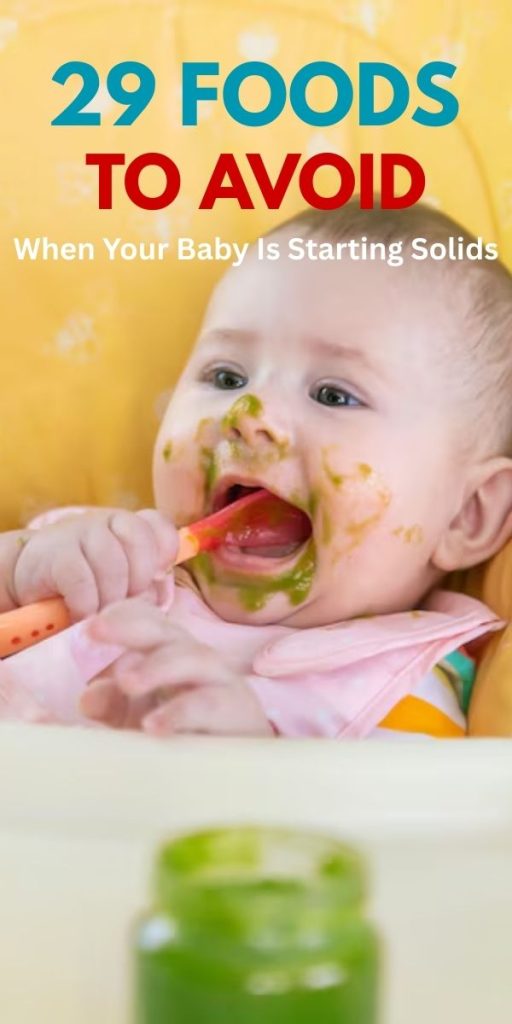Let’s talk about one of the most exciting (and nerve-wracking) milestones in parenting: introducing solids to your baby. The mess, the giggles, the faces of pure betrayal when they taste something they don’t like, it’s a rollercoaster. But here’s the thing: not every food that’s fine for us grown-ups is safe for tiny tummies.
While it’s tempting to share your favourite snacks with your little one, some foods can pose choking hazards, trigger allergies, or upset their still-developing digestive systems. So, before you slide that juicy grape or spoonful of honey across the highchair tray, let’s walk through 29 foods that should stay off the baby’s menu, at least for now.
1. Honey (Yes, Even a Tiny Drizzle)
We get it—honey feels so natural, so pure. But for babies under one year, it’s a hard no. Honey can contain spores of Clostridium botulinum, which can lead to infant botulism, a rare but serious illness. Their tiny guts just aren’t ready to handle it.
2. Whole Grapes (And Their Sneaky Cousins, Cherries)
Grapes might seem harmless, but their size and slipperiness make them a top choking hazard. The same goes for cherries, unless they’re pitted and quartered into teeny-tiny pieces. Honestly, it’s better to wait until your child has mastered chewing and swallowing properly.
3. Popcorn (Movie Nights Can Wait)
Popcorn is lightweight, irregularly shaped, and perfect for lodging in little throats. Kids under four shouldn’t be munching on this cinema snack.
4. Raw Carrots and Hard Veggies
Crunchy, raw veggies are great for us, but not so much for a baby still figuring out the whole chewing thing. Always steam or roast until soft.
5. Nuts & Whole Seeds
This one’s a double whammy: choking risk and potential allergens. While nut butters (thinned out) can be introduced early, whole nuts and seeds? Not until they’re older and can chew like pros.
6. Cow’s Milk (As a Main Drink)
Dairy lovers, hold up. While small amounts of dairy (like yoghurtt or cheese) are fine after 6 months, cow’s milk as a primary drink should wait until after 12 months. Their kidneys just can’t handle the load yet.
7. Peanut Butter The Thick Globs
Peanut butter is great for early allergen exposure, but a thick spoonful can be a choking hazard. Always thin it out with water, breast milk, or formula.
8. Processed Meats (Bacon, Sausages, Deli Slices)
They’re salty, fatty, and often packed with preservatives. Babies’ kidneys aren’t built for that sodium overload, and honestly, they don’t need that kind of processed fat yet.
9. Raw or Undercooked Eggs
Soft-boiled eggs with runny yolks? Not for your baby. There’s a risk of Salmonella. Fully cooked eggs are the way to go.
10. Raw Shellfish
Shrimp cocktails and oysters on the half shell can wait. Raw shellfish can harbour bacteria and viruses that can make babies very sick.
11. Fish High in Mercury (Swordfish, Shark, King Mackerel)
Mercury can affect developing brains. Safer fish options like salmon or tilapia are better bets for those early fishy introductions.
12. Sugary Snacks and Candies
Babies don’t need refined sugars. They don’t need those sticky candies that can lodge in their throats either. Save the sweets for when they’re older (and you’re ready for the sugar rush aftermath).
13. Salt (Even a Little Sprinkle)
Babies’ kidneys are delicate. Extra salt, even from table scraps, can be harmful. Their food might taste bland to you, but it’s perfectly seasoned for them.
14. Caffeine (Yes, Chocolate Too)
It’s not just coffee, chocolate, tea, and some sodas s sneak in caffeine too. Tiny bodies are super sensitive to stimulants. Plus, who wants a hyperactive, sleep-deprived baby?
15. Sticky Foods (Marshmallows, Gummy Candies)
Sticky textures are a choking nightmare. They’re hard to chew, harder to swallow, and can easily get stuck.
16. Hard Candy and Lollipops
A round hard candy is a choking hazard in a wrapper. Not to mention the sugar overload.
17. Unpasteurized Dairy Products
Raw milk and cheeses may seem wholesome, but they can carry dangerous bacteria. Pasteurised is the only safe option.
18. Undercooked Meats
Always make sure meat is well-cooked, tender, and shredded. Medium-rare might be your thing, but for babies, it’s a no-go.
19. Citrus Fruits (Oranges, Lemons)
Citrus is acidic and can be too harsh for babies’ sensitive stomachs. Plus, it can cause rashes around the mouth. Small, occasional tastes are fine, but don’t go overboard.
20. Spinach, Beets, and Carrots (In Large Quantities)
Surprised? These veggies can be high in nitrates, which affect how blood carries oxygen in infants under six months. Moderation is key.
21. Large Chunks of Cheese
While cheese is great for calcium, large chunks are a choking hazard. Stick to shredded or melted cheese for now.
22. Egg Whites (Before One Year)
Some paediatricians recommend waiting on egg whites due to potential allergenicity, though guidelines are changing. If in doubt, consult a paediatrician.
23. Berries with Tiny Seeds (Strawberries, Raspberries)
While berries are nutritious, their seeds can be irritating and hard to manage for very young babies. Mash them up well.
24. Rice Cereal (If It’s the Only Food)
Rice cereal is often iron-fortified, but if it’s the only food given, there’s a risk of arsenic exposure. Variety is key.
25. Sweets and Desserts (Cakes, Pastries)
We get the photo-op appeal, but sugar should be kept minimal for the first year. Let them smash a banana instead!
26. Packaged Baby Snacks with Added Sugar/Salt
Read those labels. Many “baby-friendly” snacks are sneaky with added sugars and salt.
27. Ice Cubes and Frozen Fruits
Sounds refreshing, right? But for a baby, it’s a choking risk. If you’re using frozen fruits, thaw and mash them.
28. Fried Foods
Fried chicken or fries? Babies’ digestive systems aren’t built to handle greasy, high-fat foods. Plus, they’re not getting much nutritional value.
29. Excess Water
This one surprises many parents. Babies under six months shouldn’t drink water it can dilute their sodium levels dangerously. After six months, small sips are fine, but breast milk or formula should remain primary.
Wrapping It Up Feed With Caution, Love, and A Bit of Humour
Introducing solids is a wild journey. You’ll face flying spoons, questionable facial expressions, and plenty of googling “Is this safe for my baby?” But trust your instincts, keep their safety in mind, and remember: food is as much about exploration as it is about nutrition.
And hey, if you’re ever unsure, just picture that food as a LEGO block. If it’s small, round, and smooth (like a grape or a nut), it’s probably a choking hazard. If it’s loaded with sugar, salt, or weird additives, their tiny kidneys and livers won’t thank you for it.
When in doubt, consult your paediatrician. And don’t stress, before you know it, they’ll be stealing fries off your plate like a pro.

